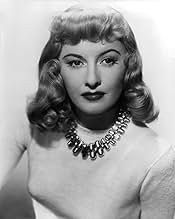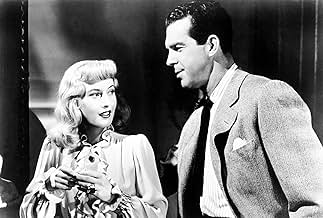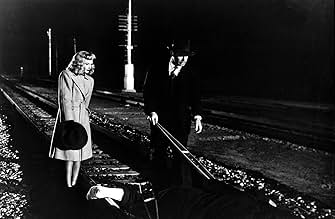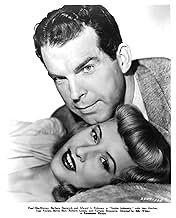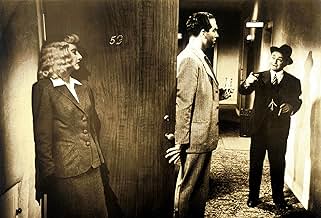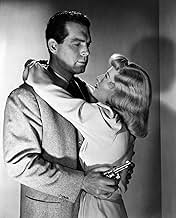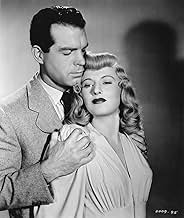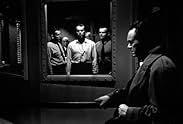Um agente de seguros se deixa convencer de um esquema de assassinato e fraude, o que desperta a suspeita de um investigador.Um agente de seguros se deixa convencer de um esquema de assassinato e fraude, o que desperta a suspeita de um investigador.Um agente de seguros se deixa convencer de um esquema de assassinato e fraude, o que desperta a suspeita de um investigador.
- Direção
- Roteiristas
- Artistas
- Indicado a 7 Oscars
- 5 vitórias e 9 indicações no total
Lev Abramov
- Stage Hand
- (não creditado)
James Adamson
- Pullman Porter
- (não creditado)
John Berry
- Bit Part
- (não creditado)
Raymond Chandler
- Man Reading Magazine Outside Keyes' Office
- (não creditado)
Edmund Cobb
- Train Conductor
- (não creditado)
Kernan Cripps
- Conductor
- (não creditado)
Betty Farrington
- Nettie - Dietrichsons' Maid
- (não creditado)
Bess Flowers
- Norton's Secretary
- (não creditado)
- Direção
- Roteiristas
- Elenco e equipe completos
- Produção, bilheteria e muito mais no IMDbPro
Resumo
Reviewers say 'Double Indemnity' is acclaimed for Billy Wilder's direction, standout performances by Fred MacMurray, Barbara Stanwyck, and Edward G. Robinson, and its pioneering film noir style. The intricate plot, dark themes, and exploration of human nature are often lauded. Voice-over narration, sharp dialogue, and unique cinematography heighten its suspense. Despite minor pacing issues and plot inconsistencies, its impact on the noir genre and cinema is significant. The lead characters' chemistry and moral complexities are noted for enhancing dramatic tension.
Avaliações em destaque
Double Indemnity begins with a car speeding on a dark, rainy night. This begins the classic film noir plot. Billy Wilder directs a steamy and grabbing film. Billy Wilder pulls this film together with an awesome cast, perfect lighting and an amusing script. Fred MacMurray plays Walter Neff, an unsuspecting insurance salesman. He is unsuspecting in the sense that he is unaware of what the femme fatale' is going to put him up to. Barbara Stanwyck plays the femme fatale', Phyllis Dietrichson, a manipulative housewife who will stop at nothing to get what she wants.
The film begins in present day giving insight into Walter's current plight. Walter Neff gives the voice over as the plot unfolds. It starts in the present time allowing the audience to know what crime has happened without the interesting details to support it. This is an interesting twist to the common film noir plot. Knowing the crime at hand keeps the audience hungry for those details. Walter is the victim of the beautiful woman who manipulates him into pulling off a murderous insurance fraud scam. Walter is an impeccable insurance salesman and Phyllis, in some ways, forces him into providing her with what she needs. Phyllis is the typical femme fatale' who has no problem in using others to get what she wants.
Throughout the film Walter is completely enamored by Phyllis. Walter could have coined the pet name baby' with his fondness towards Phyllis by calling her that throughout the film. He is easily distracted by her beauty and evil charm. He seems to be entranced by Phyllis's ankle bracelet, so much that he mentions it numerous times. This allows the audience to feel the sexual tension between the two. Phyllis, on the other hand, shows the audience that she can use and abuse anyone who gets in her way. While believably attracted to Walter, Phyllis keeps him hopping to fulfill her needs. She pulls him in and handles him like a puppet. She is the epitome of the film noir genre's femme fatale'.
Barton Keyes, played by Edward G. Robinson, is Walter's co-worker and friend at the insurance company where he works. Barton closely investigates all insurance claims that come across his desk. While at one time Walter assuredly agreed with this practice, once Barton starts to unravel the mystery behind Mrs. Dietrichson's insurance claim, we begin to see just how nervous and paranoid Walter is. Walter then begins to see Phyllis in a whole new light. Barton plays the integral part by piecing together details that are thrown around throughout the film. This keeps the tension high for the filmgoer. These details are pieced together perfectly through to the end.
Double Indemnity has the perfect plot with the perfect cast. Walter and Phyllis' attraction are tasty and the crime is wonderfully puzzling. Double Indemnity is the true film noir giant.
The film begins in present day giving insight into Walter's current plight. Walter Neff gives the voice over as the plot unfolds. It starts in the present time allowing the audience to know what crime has happened without the interesting details to support it. This is an interesting twist to the common film noir plot. Knowing the crime at hand keeps the audience hungry for those details. Walter is the victim of the beautiful woman who manipulates him into pulling off a murderous insurance fraud scam. Walter is an impeccable insurance salesman and Phyllis, in some ways, forces him into providing her with what she needs. Phyllis is the typical femme fatale' who has no problem in using others to get what she wants.
Throughout the film Walter is completely enamored by Phyllis. Walter could have coined the pet name baby' with his fondness towards Phyllis by calling her that throughout the film. He is easily distracted by her beauty and evil charm. He seems to be entranced by Phyllis's ankle bracelet, so much that he mentions it numerous times. This allows the audience to feel the sexual tension between the two. Phyllis, on the other hand, shows the audience that she can use and abuse anyone who gets in her way. While believably attracted to Walter, Phyllis keeps him hopping to fulfill her needs. She pulls him in and handles him like a puppet. She is the epitome of the film noir genre's femme fatale'.
Barton Keyes, played by Edward G. Robinson, is Walter's co-worker and friend at the insurance company where he works. Barton closely investigates all insurance claims that come across his desk. While at one time Walter assuredly agreed with this practice, once Barton starts to unravel the mystery behind Mrs. Dietrichson's insurance claim, we begin to see just how nervous and paranoid Walter is. Walter then begins to see Phyllis in a whole new light. Barton plays the integral part by piecing together details that are thrown around throughout the film. This keeps the tension high for the filmgoer. These details are pieced together perfectly through to the end.
Double Indemnity has the perfect plot with the perfect cast. Walter and Phyllis' attraction are tasty and the crime is wonderfully puzzling. Double Indemnity is the true film noir giant.
Barbara Stanwyck changed the trajectory of her career with her ruthless, icy performance here. Fred MacMurray, however, would never again allow himself to duplicate anything similar to Walter Neff's troubled, doomed portrayal again on screen. Playing against their dark alliance, it is left to Edward G. Robinson to win the audience over as he struggles to shed light on the insurance fraud and murder.
This script should be studied by anyone who plans to write for TV or movies. Note the significant changes Wilder and Chandler made from James Cain's original novel - changes Cain admitted were improvements.
Especially worthy of mention is the level of artistry displayed in the final minutes when, after an hour and a half of of bitter nastiness, Wilder gives us just the smallest spoonful of sugar that wraps everything up perfectly. There's almost something criminal when evil is such a treat to watch.
Vintage Noir Film with gritty interpretation , atmospheric settings , crackling dialogue throughout and powerhouse filmmaking . This Billy Wilder's first thriller is one of the finest Noir film ever made . A scheming wife (Barbara Stanwyck) lures an insurance salesman (Fred MacMurray , though Alan Ladd, George Raft, Brian Donlevy, James Cagney, Spencer Tracy, Gregory Peck, and Fredric March were all up for the leading role) into helping murder her husband and then declare it an accident . Both of whom concoct a twisted scheme to collect the benefits of a insurance policy . As the hubby's policy contains a clause that states that if the husband's death caused by a moving train the policy pays double face value . The investigator's boss (Edward G. Robinson) , not knowing his colleague is involved in it , suspects murder and sets out to prove it .
This first-rate and entertaining American classic Noir film draws its riveting tale and power from the interaction of finely drawn roles as well as drama , emotion and moody atmosphere . This classic mystery thriller follows James M Cain's book fairly closely otherwise . Twisted film Noir about murder , troubled relationships , treason , dark secrets , including an unforgettable dialog ; being based on the James M Cain's novel , which in turn was based on the true story of Ruth Snyder, the subject of a notorious 1920s murder trial , being screen-written by the prestigious Raymond Chandler and the same Billy Wilder . However , Billy Wilder and Raymond Chandler did not get along well while writing this film's script, a process that was apparently filled with arguments . As Billy Wilder didn't really get on with the famous novelist whose constant drinking irritated the director . It packs a good realization , an original script , haunting atmosphere , intriguing events ; for that reason madness and murder prevail . Fred MacMurray is superb as insurance salesman coerced into murder plot and Barbara Stanwick as predatory and alluring Femme Fatale is magnificent . Here his colleague Edward G Robinson is extraordinary and as cool as ever ; he plays as the astute and stubborn investigator , his scenes with Fred MacMurray are awesome and at their best . But Edward G. Robinson's initial reluctance to sign on largely stemmed from the fact he wasn't keen on being demoted to third lead . Good support cast formed by notorious secondaries such as Porter Hall , Tom Powers , Jean Heather , Byron Barr and Fortunio Bonanova . And Raymond Chandler's cameo , this marks the only film appearance of screenwriter and novelist Raymond Chandler .
Exciting as well as complex film , possessing a mysterious and fascinating blend of gripping thriller , serenity , baroque suspense in which especially stands out the portentous performances , evocative cinematography in black and white by John F. Seitz and thrilling musical score by the classic Miklos Rozsa . The motion picture was stunningly directed by the great Billy Wilder , as the American Film Institute ranked this as the #29 Greatest Movie of All Time . The film was nominated for 7 Academy Awards but lost out on the night to Going my way (1944) by Leo McCarey. It got a deep inspiration for other films , it is particularly obvious for ¨Body heat¨ by Lawrence Kasdan with William Hurt , Kathleen Turner and Richard Crenna . Remade for TV in 1954 by Buzz Kulik with Frank Lovejoy , Ray Collins and Laraine Day , and 1973 TV remake of the 1940s classic by Jack Smight with Richard Crenna , Samantha Eggar , and Robert Webber .
This first-rate and entertaining American classic Noir film draws its riveting tale and power from the interaction of finely drawn roles as well as drama , emotion and moody atmosphere . This classic mystery thriller follows James M Cain's book fairly closely otherwise . Twisted film Noir about murder , troubled relationships , treason , dark secrets , including an unforgettable dialog ; being based on the James M Cain's novel , which in turn was based on the true story of Ruth Snyder, the subject of a notorious 1920s murder trial , being screen-written by the prestigious Raymond Chandler and the same Billy Wilder . However , Billy Wilder and Raymond Chandler did not get along well while writing this film's script, a process that was apparently filled with arguments . As Billy Wilder didn't really get on with the famous novelist whose constant drinking irritated the director . It packs a good realization , an original script , haunting atmosphere , intriguing events ; for that reason madness and murder prevail . Fred MacMurray is superb as insurance salesman coerced into murder plot and Barbara Stanwick as predatory and alluring Femme Fatale is magnificent . Here his colleague Edward G Robinson is extraordinary and as cool as ever ; he plays as the astute and stubborn investigator , his scenes with Fred MacMurray are awesome and at their best . But Edward G. Robinson's initial reluctance to sign on largely stemmed from the fact he wasn't keen on being demoted to third lead . Good support cast formed by notorious secondaries such as Porter Hall , Tom Powers , Jean Heather , Byron Barr and Fortunio Bonanova . And Raymond Chandler's cameo , this marks the only film appearance of screenwriter and novelist Raymond Chandler .
Exciting as well as complex film , possessing a mysterious and fascinating blend of gripping thriller , serenity , baroque suspense in which especially stands out the portentous performances , evocative cinematography in black and white by John F. Seitz and thrilling musical score by the classic Miklos Rozsa . The motion picture was stunningly directed by the great Billy Wilder , as the American Film Institute ranked this as the #29 Greatest Movie of All Time . The film was nominated for 7 Academy Awards but lost out on the night to Going my way (1944) by Leo McCarey. It got a deep inspiration for other films , it is particularly obvious for ¨Body heat¨ by Lawrence Kasdan with William Hurt , Kathleen Turner and Richard Crenna . Remade for TV in 1954 by Buzz Kulik with Frank Lovejoy , Ray Collins and Laraine Day , and 1973 TV remake of the 1940s classic by Jack Smight with Richard Crenna , Samantha Eggar , and Robert Webber .
No need to recap the plot or echo consensus points.
From the minute he sees her slinking down the stairs in that spangled ankle bracelet, he's hooked. Walter Neff's already boarded that long, lonely trolley down the one-way track. Yes indeed, sultry Phyllis appears to be just the ticket he's been looking for. Great noir classic. All in all, Neff should have paid attention to that other member of the oddball triangle. Old man Keyes may be a born cynic, but despite himself, he's a father figure looking for a son to take his place, and warning Neff about the "Margie's" of the world. What he doesn't know is that this "Margie" definitely doesn't drink out of a bottle. What's more, Neff's already chosen to ride with the flashy crowd, get out of that dumpy apartment, and get into Phyllis's vicious little insurance swindle. As Keyes tellingly remarks, "You're not smarter than the rest, Walter, just a little taller." I like to think that Walter finally realizes his folly in that brilliant final scene, even if it is too late. Still, the film's cynical veneer is misleading. Because beneath all the deceits, betrayals, and ironies, lies a lighted match and one of the odder father-son relationships in Hollywood annals.
From the minute he sees her slinking down the stairs in that spangled ankle bracelet, he's hooked. Walter Neff's already boarded that long, lonely trolley down the one-way track. Yes indeed, sultry Phyllis appears to be just the ticket he's been looking for. Great noir classic. All in all, Neff should have paid attention to that other member of the oddball triangle. Old man Keyes may be a born cynic, but despite himself, he's a father figure looking for a son to take his place, and warning Neff about the "Margie's" of the world. What he doesn't know is that this "Margie" definitely doesn't drink out of a bottle. What's more, Neff's already chosen to ride with the flashy crowd, get out of that dumpy apartment, and get into Phyllis's vicious little insurance swindle. As Keyes tellingly remarks, "You're not smarter than the rest, Walter, just a little taller." I like to think that Walter finally realizes his folly in that brilliant final scene, even if it is too late. Still, the film's cynical veneer is misleading. Because beneath all the deceits, betrayals, and ironies, lies a lighted match and one of the odder father-son relationships in Hollywood annals.
"I liked the way that anklet bit into her leg. I wanted to see her again, up close, without that silly staircase between us."--Walter Neff, after meeting Phyllis Dietrichson This is Fred MacMurray like you've never seen him before. He's edgy and sharp, and amoral, although he hides it well from his boss. Barbara Stanwyck's astounding performance set the standard for bad girls in Film Noir for years to come. I love this film because it is a perfect example of how the censorship of the time made it so that filmmakers had to get the sexiness across in a subtle way. This movie is undeniably sexy, and there's not a single 'love scene' in it!
Você sabia?
- CuriosidadesAuthor James M. Cain later admitted that if he had come up with some of the solutions to the plot that screenwriters Billy Wilder and Raymond Chandler did, he would have employed them in his original novel.
- Erros de gravaçãoWhen Walter first kisses Phyllis, a wedding ring can be seen on Walter's hand. Fred MacMurray was married, and the ring was not noticed until post-production.
- Citações
[last lines]
Walter Neff: Know why you couldn't figure this one, Keyes? I'll tell ya. 'Cause the guy you were looking for was too close. Right across the desk from ya.
Barton Keyes: Closer than that, Walter.
Walter Neff: I love you, too.
- Cenas durante ou pós-créditosOpening credits are shown over a silhouette of a man on crutches, walking toward the camera.
- ConexõesEdited into Cliente Morto Não Paga (1982)
Principais escolhas
Faça login para avaliar e ver a lista de recomendações personalizadas
Detalhes
- Data de lançamento
- País de origem
- Central de atendimento oficial
- Idioma
- Também conhecido como
- Pacto de sangre
- Locações de filme
- 6301 Quebec Drive, Hollywood Hills, Los Angeles, Califórnia, EUA(Dietrichson house)
- Empresa de produção
- Consulte mais créditos da empresa na IMDbPro
Bilheteria
- Orçamento
- US$ 927.262 (estimativa)
- Faturamento bruto mundial
- US$ 21.026
- Tempo de duração
- 1 h 47 min(107 min)
- Cor
- Proporção
- 1.37 : 1
Contribua para esta página
Sugerir uma alteração ou adicionar conteúdo ausente



